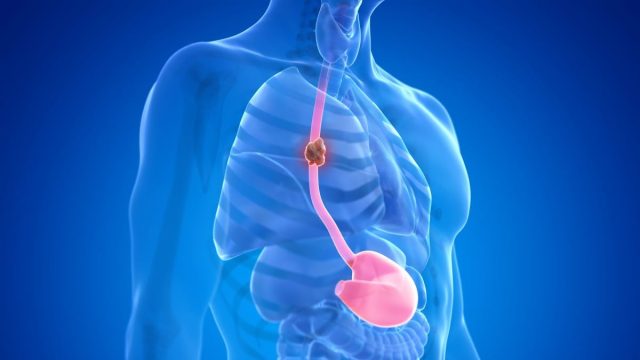One-year progression-free survival, overall survival was 79.4, 89.6 percent; significantly longer survival seen in patients who achieved resectability
By Elana Gotkine HealthDay Reporter
MONDAY, Nov. 18, 2024 (HealthDay News) — For patients with unresectable locally advanced esophageal squamous cell carcinoma (ESCC), chemoradiotherapy (CRT) followed by immunochemotherapy (iCT) and then surgery is promising, according to a study published online Nov. 15 in Clinical Cancer Research.
Xin Wang, from the Chinese Academy of Medical Sciences and Peking Union Medical College in Beijing, and colleagues examined the safety and efficacy of CRT followed by iCT and surgery for unresectable locally advanced ESCC. Patients received radiotherapy and nab-paclitaxel plus cisplatin for five weeks, followed by tislelizumab plus chemotherapy (nab-paclitaxel and cisplatin) for two 21-day cycles. Patients who converted to resectable then underwent surgery. One-year progression-free survival (PFS) was the primary end point.
Thirty patients were enrolled and underwent CRT; 24 of these received iCT. The researchers found that 20 patients (66.7 percent) achieved resectability (R0: 95.2 percent). The one-year PFS rate was 79.4 percent, and the overall survival rate was 89.6 percent. Significantly longer PFS and overall survival were exhibited by the R0 resection group (hazard ratios, 0.28 and 0.18, respectively). Eleven patients (36.7 percent) had grade 3 to 4 adverse events, and five of those receiving iCT had immune-related pneumonitis (20.8 percent). There was an association seen for post-CRT minimal residual disease before surgery with unfavorable PFS and overall survival.
“The neoadjuvant treatment approach we tested has the potential to make initially unresectable tumors resectable, giving patients the opportunity to have a durable cancer-free state,” Li said in a statement. “Our trial clearly demonstrated the effectiveness of combining chemoradiotherapy, chemoimmunotherapy, and surgery compared to nonsurgical management alone. We were confident in potential benefits of adding immunotherapy to chemoradiotherapy, but the remarkable pathologic complete response and the strong survival outcomes far exceeded our expectations.”
Two authors disclosed ties to Nanjing Geneseeq Technology.
Copyright © 2024 HealthDay. All rights reserved.



















